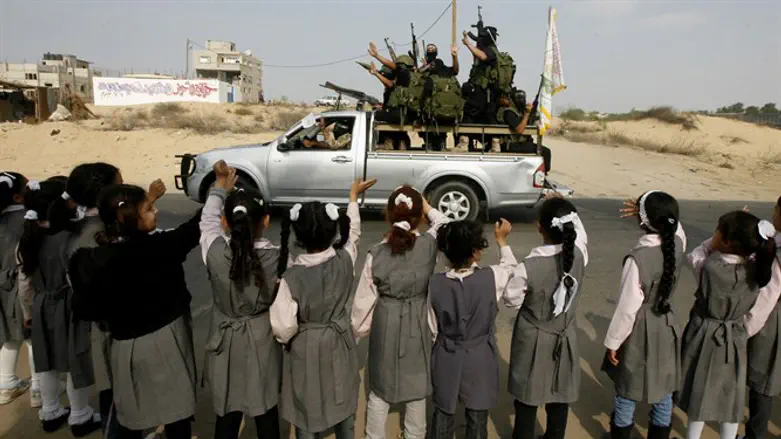
This week, the German ambassador to Israel, Dr. Susanne Wasum-Rainer, will address the INSS in Tel Aviv concerning the German view of Middle East negotiations at this time.
To what should Germany and German taxpayers be paying attention in this context?
Germany, a democratic power in Europe with peace-oriented policy worldwide, is a principal donor state to both the Palestinian Authority (PA) and the United Nations Relief and Works Agency (UNRWA) for the 1948 Palestinian refugees and their descendants.
Last year, Germany provided UNRWA with $76,468,714 .
In 2018, Germany promises more than $100 million to UNRWA.
As such, it shoulders the responsibility towards its tax-paying citizens for assuring that their money is not channeled in non-peaceful directions.
One of the best and simplest ways of doing that is checking the attitude of textbooks issued by the PA, and used in UNRWA schools, toward the Israeli/Jewish “other” and to the issue of peace with that “other”.
The Center for Near East Policy Research has completed its reseach on all 364 textbooks used by the PA and UNRWA, and it seems advisable that an effort be made to provide this information to the German reader in his/her own language.
Schoolbooks are the most revealing source of information regarding the values and aspirations a society wishes to instill in the minds of its youngsters. In a state of conflict, they serve as a reliable indicator of the existence, or non-existence, of peace education.
In 1994, the Palestinian Authority (PA) was established in areas of Judea, Samaria (aka 'West Bank') and Gaza
The PA assumed most governmental powers in those areas, including education. In 2000 it started issuing its own schoolbooks in a process that lasted until 2006. A newer set of PA schoolbooks was published between the years 2016-2018.
The United Nations Relief and Works Agency (UNRWA) for the 1948 Palestinian refugees and their descendants, uses the PA books in its schools.
UNRWA, as a UN agency, is bound by the UN endorsed principle of resolving the Israeli-Palestinian conflict peacefully, as well as by UNESCO principles of peace education (see the Appendix below). Also, as a UN agency, it should treat all member states equally, including the State of Israel.
It is incumbent on the German taxpayer to see whether the PA textbooks used in UNRWA schools advocate a peace or call for an armed struggle, recognize the existence of Israel as a sovereign state in the region and the presence of its six-million Jewish citizens in the country as well as their holy places there, treat Jewish/Israeli individuals as ordinary human beings, renounce terrorist activity against civilians, employ self-criticism in this regard, etc.
All these are sensitive issues not only in the context of Israeli-Palestinian relations, but also against the background of German-Jewish history and past relations.
Germany, more than any other country, should be extra-careful while dealing with issues closely connected to the safety and wellbeing of the citizens of the Jewish State.
German citizens will be surprised to see what their taxes are funding and even more, if they keep the UNESCO Principles of Education (see below) in mind..
Appendix: UNESCO Principles of Education for Peace and Tolerance
- Does the curriculum promote tolerance, understanding and respect of the “other”, its culture, achievements, values and way of life? [1]
- Does the curriculum develop capabilities for non-violent conflict resolution? [2]
- Does the curriculum promote peace? [3]
- Does the curriculum promote international understanding and cooperation?
- Does it motivate the student to understand and bear responsibility for the keeping of peace? [4]
- Is the curriculum free of wording, imagery and ideologies likely to create prejudices, misconceptions, stereotypes, misunderstandings, mistrust, racial hatred, religious bigotry and national hatred, as well as any other form of hatred or contempt for other groups or peoples? [5]
- Is all the educational material (textbooks, workbooks, teachers’ guides, maps, illustrations, instructional aids) up-to-date, accurate, balanced and unprejudiced? Does it use equal standards to promote mutual knowledge and understanding between different peoples? [6]
- Does the curriculum include objective, complete and up-to-date data, as well as critical analysis of the historical and contemporary factors at the root of the differences, conflicts and tension between states and groups, as well as ways to overcoming those differences? [7]
Why these questions?
[1] Based on the “Declaration of Principles on Tolerance”, proclaimed and signed by member states of UNESCO on November 16, 1995, Articles 1, 4.2.
[2] Based on the “Integrated Framework for action on Education for Peace, Human Rights and Democracy”, approved by the General Conference of UNESCO at its twenty-eight session, Paris, November 1995, Article 9, and on the afore-mentioned “Declaration of Principles on Tolerance”, Article 5.
[3] Ibid., Article 6.
[4] Based on “UNESCO Recommendations concerning Education for International Understanding, Cooperation and Peace and Education relating to Human Rights and Fundamental Freedoms”, adopted by the General Conference at its eighteenth session, Paris, November 19, 1974, Articles III 6 and IV 7.
[5] Ibid., Articles III 6, IV 7, VII 39, and the afore-mentioned “Integrated Framework”, Article 18.
[6] Ibid., Articles VI 39, X 45 and “the Declaration of Principles on Tolerance”, Article 4.3.
[7] Based on the afore-mentioned “UNESCO Recommendations”, Article V 14.